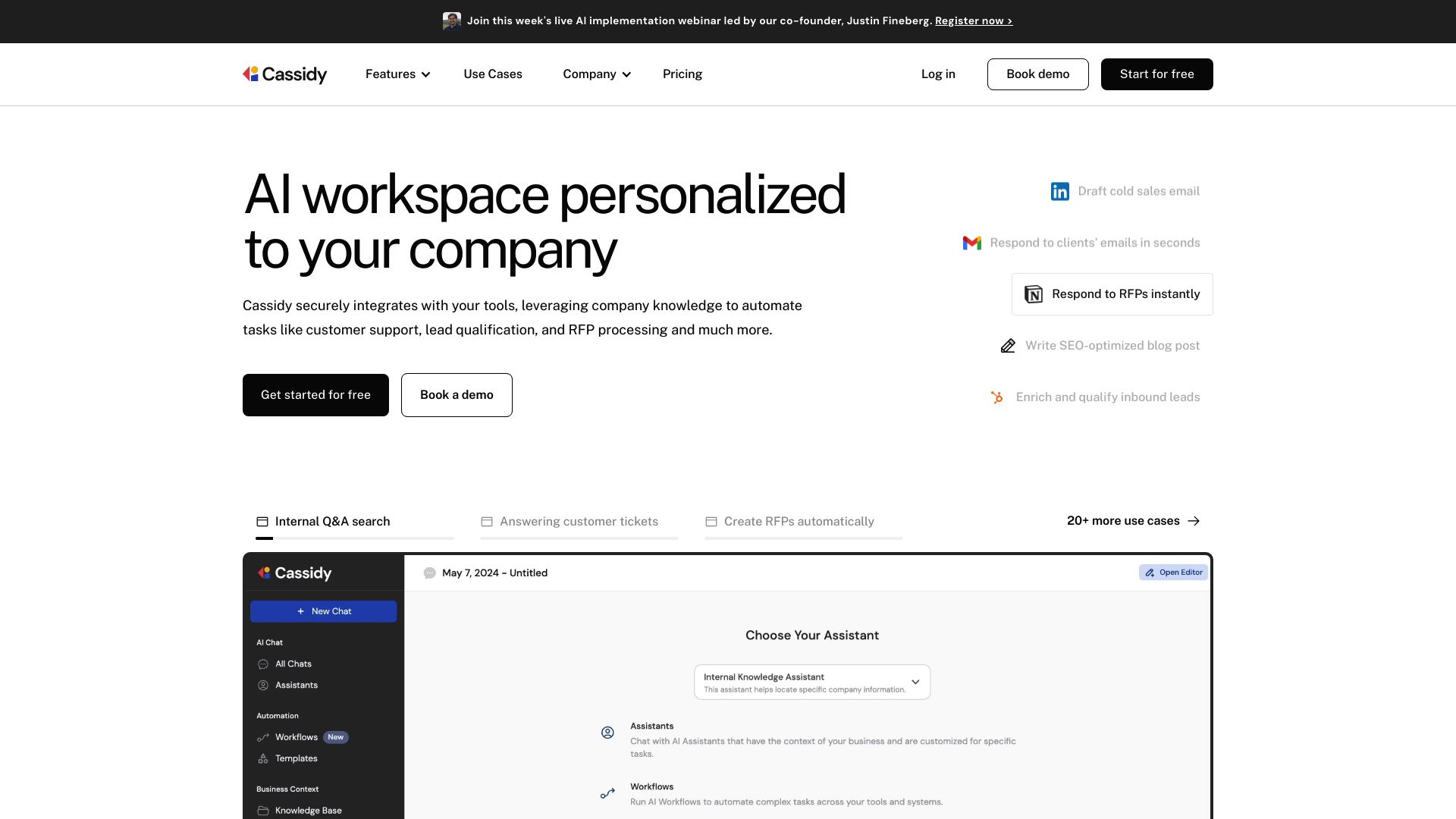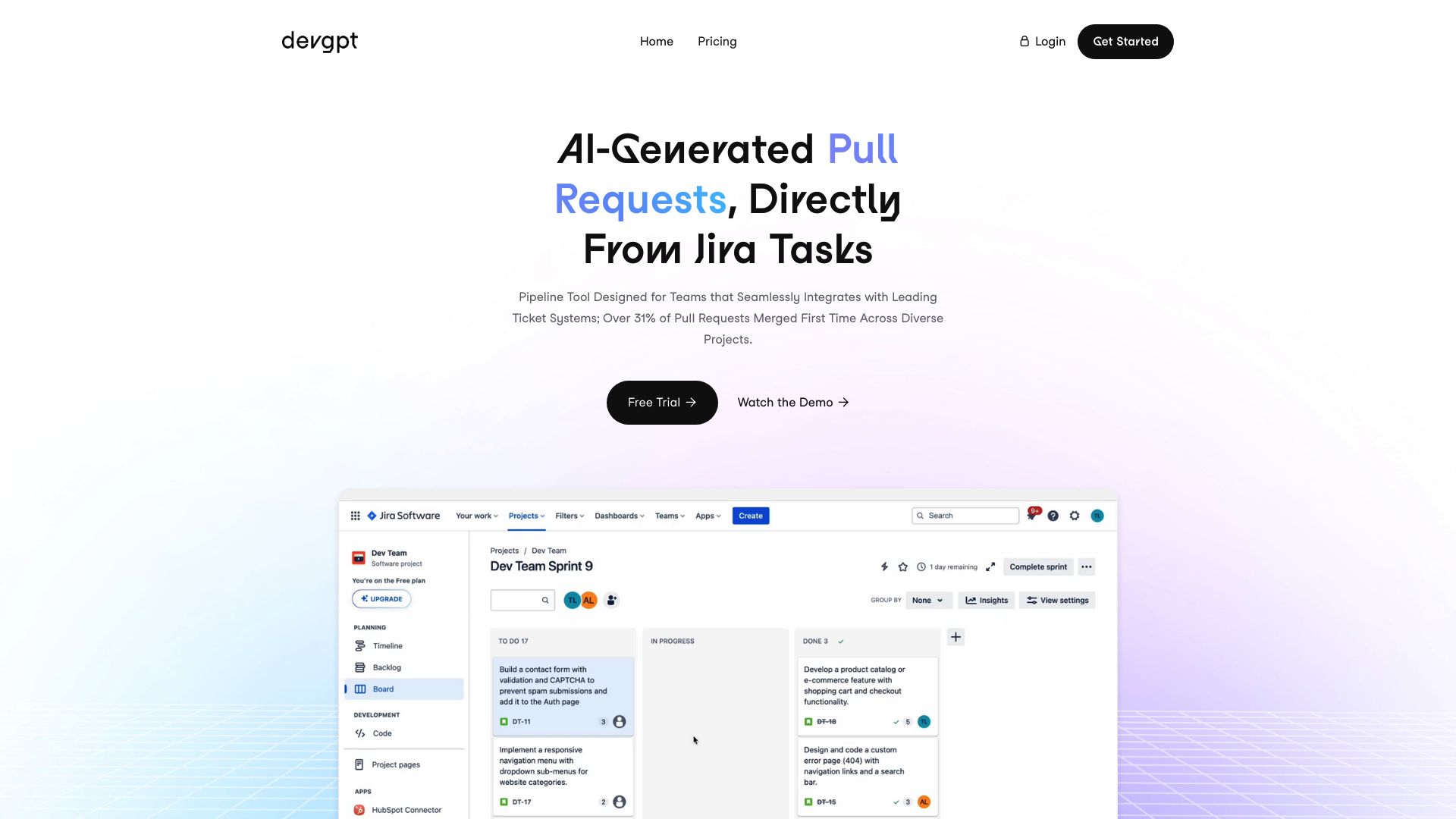Cassidy vs. DevGPT: Comparing AI Development Platforms
AI-powered development tools revolutionize how businesses and developers create software and automate processes. This comparison explores Cassidy vs. DevGPT, and SmythOS—three innovative platforms reshaping the AI landscape. Cassidy empowers non-technical users to build custom AI assistants, while DevGPT accelerates coding with AI-generated snippets.
SmythOS stands out as a comprehensive solution for AI agent development and deployment across diverse use cases. We’ll examine each platform’s unique features, strengths, and limitations to help you choose the right tool for your AI development needs, whether you’re a seasoned developer, business leader, or AI enthusiast looking to harness the power of artificial intelligence.
Cassidy Overview
Cassidy empowers businesses to create custom AI assistants and workflows without coding expertise. The platform integrates seamlessly with existing tools, leveraging company data to automate tasks like customer support, lead qualification, and RFP processing.


Cassidy’s no-code workflow builder allows users to design complex AI automations through a drag-and-drop interface. This visual approach simplifies the creation of AI-powered processes, enabling teams to automate data scraping, knowledge base searches, and text generation tasks efficiently.
Cassidy’s no-code workflow builder allows users to design complex AI automations through a drag-and-drop interface. This visual approach simplifies the creation of AI-powered processes…
The platform stands out for its model-agnostic approach, allowing businesses to use any foundational AI model. This flexibility future-proofs AI strategies and adapts to evolving needs. Cassidy also prioritizes enterprise-grade security, ensuring data confidentiality by never using client information for model training.
While Cassidy offers robust features for AI automation, it lacks some advanced capabilities. The platform doesn’t explicitly mention multimodal support or a dedicated debug mode, which could limit its applicability in certain complex scenarios. Additionally, the absence of a hosted vector database may require users to manage their own data storage solutions for large-scale AI operations.
Despite these limitations, Cassidy’s focus on user-friendly AI development and seamless integration with popular business tools positions it as a valuable solution for companies looking to harness AI without extensive technical resources. The platform’s browser extensions further enhance its utility, bringing AI capabilities directly into web applications like LinkedIn and email clients.
DevGPT Overview
DevGPT transforms the software development landscape with its AI-powered coding assistant. This open-source platform empowers developers to generate code from natural language descriptions, streamlining the coding process and boosting productivity.


DevGPT’s core strength lies in its ability to understand and translate human language into functional code. The platform leverages advanced AI models like GPT-4 and Codex to generate context-relevant code snippets, saving developers significant time on repetitive tasks. Users report saving over 10 hours per week, allowing them to focus on more complex coding challenges.
DevGPT’s core strength lies in its ability to understand and translate human language into functional code.
The platform offers seamless integration with popular development tools such as GitHub and Jira. This integration enables developers to generate pull requests directly from tasks or tickets, further streamlining the development workflow. DevGPT also provides personalized training, allowing the AI to learn from a developer’s existing codebase and generate code that matches their unique style.
While DevGPT excels in many areas, it currently focuses primarily on serving individuals and small teams. This may limit its appeal for larger enterprises seeking more comprehensive, scalable solutions. Additionally, the platform’s reliance on external AI models could potentially impact its long-term pricing structure and performance capabilities.
Looking ahead, DevGPT aims to expand its reach to companies of all sizes and foster an engaged community of users and contributors. This vision aligns with the growing trend of AI-assisted software development, positioning DevGPT as a potentially indispensable tool for developers seeking to enhance their productivity and coding efficiency.
Feature Comparison
SmythOS and DevGPT offer divergent approaches to AI-assisted software development. SmythOS provides a comprehensive platform for building and deploying AI agents across various use cases, while DevGPT focuses specifically on code generation from natural language prompts.
SmythOS excels in its broad range of deployment options and integrations. Users can deploy AI agents as APIs, webhooks, scheduled tasks, or chatbots, providing flexibility for different applications. The platform also supports multi-agent collaboration and autonomous operation, enabling complex workflows. In contrast, DevGPT’s capabilities center around translating natural language into code snippets, which serves a narrower but highly specialized purpose.
Security and scalability represent key differences between the platforms. SmythOS emphasizes enterprise-grade security features like data encryption, OAuth integration, and IP control. It also offers a hosted vector database for efficient data management at scale. DevGPT, while powerful for individual developers, lacks explicit mentions of comparable security measures or scalability options for larger teams or enterprises.
Feature Comparison Table
| Cassidy | DevGPT | SmythOS | |
|---|---|---|---|
| CORE FEATURES | |||
| Hosted Agents (Dev, Production) | ✅ | ❌ | ✅ |
| Environments (Dev, Production) | ✅ | ❌ | ✅ |
| Visual Builder | ✅ | ❌ | ✅ |
| No-Code Options | ✅ | ❌ | ✅ |
| Autonomous Agents | ❌ | ❌ | ✅ |
| Explainability & Transparency | ❌ | ❌ | ✅ |
| Multimodal | ❌ | ❌ | ✅ |
| Multi-Agent Collaboration | ❌ | ❌ | ✅ |
| Audit Logs for Analytics | ❌ | ❌ | ✅ |
| Bulk Work | ✅ | ❌ | ✅ |
| Agent Work Scheduler | ✅ | ❌ | ✅ |
| Logs & Monitoring | ✅ | ❌ | ✅ |
| SECURITY | |||
| Constrained Alignment | ✅ | ❌ | ✅ |
| Data Encryption | ✅ | ❌ | ✅ |
| OAuth | ✅ | ❌ | ✅ |
| IP Control | ❌ | ❌ | ✅ |
| COMPONENTS | |||
| Foundation AIs | ✅ | ❌ | ✅ |
| Huggingface AIs | ❌ | ❌ | ✅ |
| Zapier APIs | ✅ | ❌ | ✅ |
| All other APIs, RPA | ✅ | ❌ | ✅ |
| Classifiers | ❌ | ❌ | ✅ |
| Logic | ✅ | ❌ | ✅ |
| Data Lakes | ❌ | ❌ | ✅ |
| DEPLOYMENT OPTIONS (EMBODIMENTS) | |||
| Deploy as API | ✅ | ❌ | ✅ |
| Deploy as Webhook | ✅ | ❌ | ✅ |
| Staging Domains | ❌ | ❌ | ✅ |
| Production Domains | ❌ | ❌ | ✅ |
| API Authentication (OAuth + Key) | ❌ | ❌ | ✅ |
| Deploy as Site Chat | ❌ | ❌ | ✅ |
| Deploy as Scheduled Agent | ✅ | ❌ | ✅ |
| Deploy as GPT | ❌ | ❌ | ✅ |
| Scalability | ✅ | ❌ | ✅ |
| DATA LAKE SUPPORT | |||
| Hosted Vector Database | ❌ | ❌ | ✅ |
| Sitemap Crawler | ❌ | ❌ | ✅ |
| YouTube Transcript Crawler | ❌ | ❌ | ✅ |
| URL Crawler | ❌ | ❌ | ✅ |
| PDF Support | ✅ | ❌ | ✅ |
| Word File Support | ✅ | ❌ | ✅ |
Best Alternative to Cassidy and DevGPT
SmythOS stands out as the superior alternative to Cassidy and DevGPT, offering a comprehensive platform for AI agent development and deployment. We provide a versatile solution that empowers users to create and manage AI agents across various applications with unparalleled ease and flexibility.
Our visual builder sets SmythOS apart from competitors. Unlike DevGPT’s code-centric approach, we offer an intuitive drag-and-drop interface that allows users to design complex AI workflows without extensive coding knowledge. This democratizes AI development, making it accessible to a broader audience while still providing the depth and customization options that experienced developers require.
SmythOS excels in deployment versatility… We enable users to deploy AI agents as APIs, webhooks, scheduled tasks, site chats, and even as GPT models.
SmythOS excels in deployment versatility, a critical area where both Cassidy and DevGPT fall short. We enable users to deploy AI agents as APIs, webhooks, scheduled tasks, site chats, and even as GPT models. This flexibility ensures that AI solutions can be seamlessly integrated into existing systems and workflows, regardless of the specific use case or industry.
Security and scalability are paramount in enterprise AI solutions, and SmythOS delivers on both fronts. We implement robust security measures, including data encryption, OAuth integration, and IP control, providing a level of protection that surpasses both Cassidy and DevGPT. Our platform is designed to scale effortlessly, supporting enterprise-level deployments without compromising performance or security.
While Cassidy and DevGPT offer valuable tools for specific AI tasks, SmythOS provides a complete ecosystem for AI agent development, deployment, and management. Our platform’s combination of user-friendly design, extensive integration capabilities, robust security features, and scalable architecture makes it the ideal choice for businesses and developers looking to harness the full potential of AI technology across unlimited use cases.
Conclusion
Cassidy and DevGPT offer specialized solutions for AI-assisted business processes and coding, respectively. Cassidy empowers non-technical users to create custom AI assistants, while DevGPT focuses on streamlining code generation for developers. Both platforms have their strengths, but SmythOS emerges as the superior choice for comprehensive AI development and deployment.
SmythOS stands out with its versatile drag-and-drop interface, extensive integration ecosystem, and support for multiple AI models. Unlike Cassidy and DevGPT, SmythOS enables users to create and deploy AI agents across various platforms, from APIs to chatbots, with unparalleled ease. This flexibility, combined with features like multi-agent collaboration and a hosted vector database, positions SmythOS as a more robust solution for businesses of all sizes.
While Cassidy and DevGPT excel in their niches, SmythOS offers a broader range of capabilities that cater to diverse needs. Its emphasis on scalability, security, and ease of use makes it an ideal choice for enterprises looking to harness the full potential of AI. SmythOS not only matches the core functionalities of its competitors but also provides advanced features like autonomous agents, multimodal support, and comprehensive debugging tools.
For businesses and developers seeking to revolutionize their AI workflows, SmythOS offers the most comprehensive and flexible solution. We invite you to explore our diverse range of AI-powered agent templates and create a free SmythOS account to experience firsthand how our platform can transform your AI development process. With SmythOS, you’re not just adopting a tool; you’re embracing the future of AI-powered productivity and innovation.
Last updated:
Disclaimer: The information presented in this article is for general informational purposes only and is provided as is. While we strive to keep the content up-to-date and accurate, we make no representations or warranties of any kind, express or implied, about the completeness, accuracy, reliability, suitability, or availability of the information contained in this article.
Any reliance you place on such information is strictly at your own risk. We reserve the right to make additions, deletions, or modifications to the contents of this article at any time without prior notice.
In no event will we be liable for any loss or damage including without limitation, indirect or consequential loss or damage, or any loss or damage whatsoever arising from loss of data, profits, or any other loss not specified herein arising out of, or in connection with, the use of this article.
Despite our best efforts, this article may contain oversights, errors, or omissions. If you notice any inaccuracies or have concerns about the content, please report them through our content feedback form. Your input helps us maintain the quality and reliability of our information.
